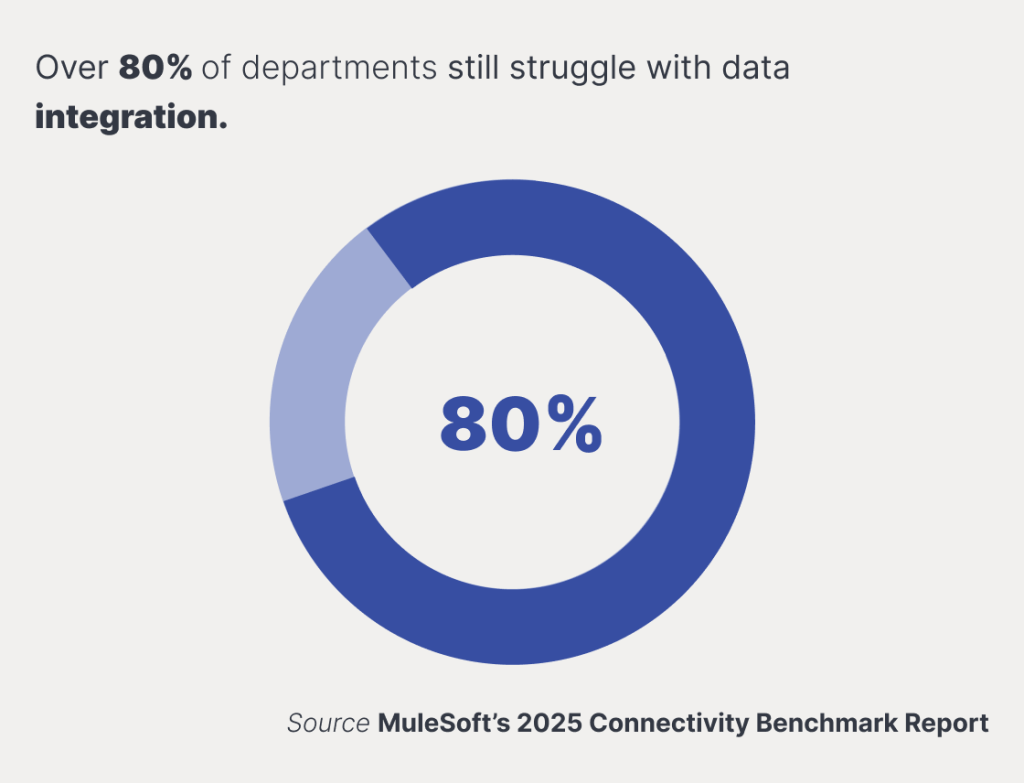According to IT leaders, at least 80% of key company departments – data science, technology, sales and customer service – are highlighting the need to integrate systems and improve data quality across the organization. A large amount of data does not guarantee profitability – on the contrary, it can cause serious problems. Learn how scattered and neglected data can reduce your company's performance and profitability.
Key takeaways from this article
- Poor quality data increases operational costs, forcing teams to focus on time-consuming fixes instead of strategic initiatives.
- Inaccurate data leads to a loss of customer trust and inconsistent communication between departments, which can seriously damage brand reputation and sales performance.
- Implementing automation and AI-based solutions without integrated data is risky, inefficient and can stall organization growth
Impact of poor data quality on your organization
Incorrect, outdated, scattered, or inconsistent data has costly consequences – from rising operational costs to a loss of customer trust and reduced capacity to implement modern technologies like automation and AI. Below are some of the key risks linked to poor data quality.
Operating costs due to erroneous data
Low data quality often leads to hidden operational costs. Instead of focusing on their core responsibilities, employees spend time correcting outdated or inaccurate data. This extends business processes, wastes valuable time, and increases costs across the organization.
Risk of losing customers and low levels of trust
Customers expect relevant communication and consistent service. When organizations rely on faulty or siloed data, they may send the wrong offers, duplicate messages, or outdated terms. Internally, teams lose alignment and share conflicting information.
According to IT leaders, more than 80% of departments (data science, tech, sales, and customer service) need system integration. Without it, customer interactions appear unprofessional and disjointed – damaging trust, weakening brand perception, and pushing customers toward competitors.

Problems with automation and AI implementation
Poor data quality is a major obstacle to automation and AI implementation. These technologies require accurate, complete, and standardized data to function effectively. When systems learn from flawed data, they produce unreliable results – limiting their business value.
Disconnected systems and data silos further complicate matters, preventing organizations from forming a full, actionable picture of their customers, operations, and market landscape. As a result, poor data quality doesn’t just reduce efficiency – it blocks innovation, slows growth, and prevents effective use of analytics and AI.
Conclusion
Managing data quality is of strategic importance today. Disjointed data generates measurable operational costs, taking staff time that could be spent on tasks of greater importance to the company. They also lead to communication chaos, the risk of losing customers and the erosion of trust – both inside and outside the organization. Companies that want to remain competitive should invest in organizing their data, integrating their systems and building a solid information foundation. This is a prerequisite not only for operational efficiency, but also for innovation and organizational resilience to change.
If you want to learn how to turn data into real value and competitive advantage, check out how to build a foundation for digital transformation with Salesforce optimization. And in upcoming articles, we'll discuss how improving data quality translates into business value, among other things.



